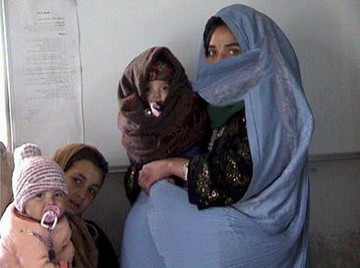By Alex Crawford
It is an extraordinary meeting. There is me on one side of the room and an array of women all piled on top of an Afghan bed on the other.

Afghan women face the worst conditions in the world.
They look at me. I mean really look at me. I am probably one of the few Westerners they have ever seen, maybe the only one.
Then the questions come. "Are you married? Do you have any children? Have you any boys? Have you thought of becoming a Muslim? Why do you leave your children? How old are you?"
The last question comes from a small woman who I think must be very old and who has lived what looks like a pretty hard and long life.
I put up my hands so they can count the numbers. It goes on for a while and their eyes widen with unshielded shock as I show ten, twenty, thirty, forty-seven fingers.
I don't need a translation as I watch their faces.
"She is OLD," they are thinking.
There is one male in the room. He is the son of the woman who has asked my age.
"You are older than my mother," he says with unabashed astonishment.
The bent-over old woman with the weather-beaten, lined face, few teeth and crusty hands who is his mother, is only 40.
Her life in comparison to mine has been as tough as they come from the moment she was born.
It has been incredibly physical much like the majority of poor women in the country.
She has given birth in a country which still has one of the highest maternal mortality rates in the world - and she has done that nine times.
She has reared her children in one of the most dangerous places in the world, done the cooking in one of the poorest places on the planet and managed the washing and cleaning in a country where running water is still scarce and considered a downright dream in many cases.
She has never been to school. She does not know how to read or write. She has never been to a dentist or a doctor.
She tells me she has been raped and beaten, both as a child and as an adult. Her life story is not unusual.
In the circumstances I think she looks pretty damn good for her age.
She does not expect much - in fact she expects life to kick her in the guts because that is how it has been for the past four decades.
Life is a bit better now because her husband has shifted his attentions to the second wife, who is relatively young at 36 and still able to bear children.
"You look healthy," she tells me.
I feel somehow ashamed at my privileged life and all the things I take so much for granted like having a home and a healthy family, like waking up every morning without hearing helicopters overhead or the sound of gunfire as I go to sleep, like being able to turn on a tap and get water.
They offer tea and her son orders his wife to get it - and quickly. She scurries out.
"My wife is very sick," he sighs. "We've been married five years and still no children. She's no good."
She is 20 years old.
The young woman brings in tea - just for me. The crowd of women opposite get offered nothing and expect nothing.
The milk has been milked from their cow outside.
My male colleagues are not allowed inside this home, not even over the threshold.
In this deeply religious area of Kunar, the women are not allowed to be seen by males they are not related to.
They cannot be filmed, they cannot talk to them, they cannot even meet them. Their lives are utterly controlled by their men.
They have no say in their work, what their men do, whether they belong to the Taliban or not, or whether they should provide food for the fighters or their foreign guests.
They believe in Islam and Allah and they have a mantra: "Allah will provide. Allah knows best. Allah will look after us."
With me however, the women are more free and easy with their opinions.
One of them who's sitting on the floor breastfeeding her six-month-old baby tells me: "Don't go too far away from here. They like kidnapping people like you around here."
She is smiling but it does not look all too friendly. The women know their men are in the insurgency.
They see the weapons, they help with the injuries, they hear the sounds of battle.
They cannot stop it nor do they even try. They are coping with living day to day, trying to find bread to put on the table at night, trying to keep their children alive.
Their mothers and their mothers' mothers have all lived with conflict in Afghanistan and they say it was much harder back then.
"We don't like the coalition troops," says one. "They bomb our homes and kill our people. They said they came here to help us but we don't see it."
Fighting is a way of life here and the women have been coping since birth with their men battling one way or another. Life has never been easy.



